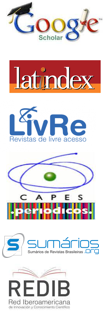Adaptações/Flexibilizações Curriculares: o que Dizem as Teses e Dissertações Presentes na Capes no Período de 2015 a 2019 Sobre essas Medidas de Acessibilidade ao Currículo Escolar?
DOI:
https://doi.org/10.17921/2447-8733.2022v23n2p%25pResumo
Resumo
O presente artigo se insere na discussão sobre a inclusão escolar de estudantes com necessidades educacionais especiais, especialmente os que são acometidos por deficiência, transtorno global do desenvolvimento (TGD) e altas habilidades/superdotação, conforme amparo da legislação específica para esse alunado. Partindo dessa realidade, o objetivo foi apresentar pesquisas stricto sensu sobre adaptações/flexibilizações curriculares no contexto da educação especial. Para a sua realização foram selecionadas pesquisas cadastradas no Banco de Teses e Dissertações da Coordenação de Aperfeiçoamento de Pessoal de Nível Superior – Capes, de 2015 a 2019. Foram analisados três teses e 15 dissertações, para isso se organiza um quadro, no qual são distribuídas informações relevantes do material pesquisado. Além disso, organizam-se semanticamente as 18 pesquisas em três momentos: adaptações curriculares, formação docente e práticas pedagógicas; adaptações curriculares e estudantes com deficiência intelectual; e, adaptações curriculares, gestão e políticas públicas inclusivas. Os resultados apontam que as expressões adaptações curriculares (ACs)/flexibilizações curriculares (FCs) são, na maioria das vezes, utilizadas como equivalentes, no entanto, constata-se que apenas três trabalhos analisados fazem uso mais recorrente de FCs para se referir às adequações do/no currículo escolar. As pesquisas apresentadas mostram a necessidade de outras investigações a respeito da horizontalização do currículo, uma vez que essa atitude pedagógica oferece indicativos emancipatórios ao possibilitar reflexão crítica sobre os conteúdos, as aulas e o desenvolvimento acadêmico dos alunos, que não conseguem aprender da forma convencional.
Palavras-chave: Currículo. Educação Especial. Inclusão Escolar. Pesquisas. Necessidades Educacionais Especiais.
Abstract
This article is part of the discussion on the school inclusion of students with special educational needs, especially those affected by disability, global developmental disorder (PDD) and high abilities/giftedness, in accordance with the specific legislation for this student. Based on this reality, the objective of this study was to present stricto sensu research on curriculum adaptations/flexibility in the special education context. To carry it out, research was selected registered in the Theses and Dissertations Bank of the Coordination for the Improvement of Higher Education Personnel - Capes, from 2015 to 2019. Three theses and 15 dissertations were analyzed, for that we organized a table in which we distributed relevant information from the material researched. In addition, the 18 surveys were semantically organized into three moments: curricular adaptations, teacher’s training and pedagogical practices; curricular adaptations and students with intellectual disabilities; and, curricular adaptations, management and inclusive public policies. The results show that the expressions curriculum adaptations (ACs)/curricular flexibility (FCs) are, most of the time, used as equivalent, however, it was found that only three analyzed works make more frequent use of FCs to refer to adjustments of/ in the school curriculum. The research presented shows the need for further investigations regarding the curriculum horizontalization, since this pedagogical attitude offers emancipatory indications by enabling critical reflection on the contents, classes and academic development of students who cannot learn in the conventional way.
Keywords: Curriculum. Special Education. School Inclusion. Studies. Special Educational Needs.
Downloads
Publicado
Como Citar
Edição
Seção
Licença
Copyright (c) 2022 Revista de Ensino, Educação e Ciências Humanas

Este trabalho está licenciado sob uma licença Creative Commons Attribution-NonCommercial-NoDerivatives 4.0 International License.


